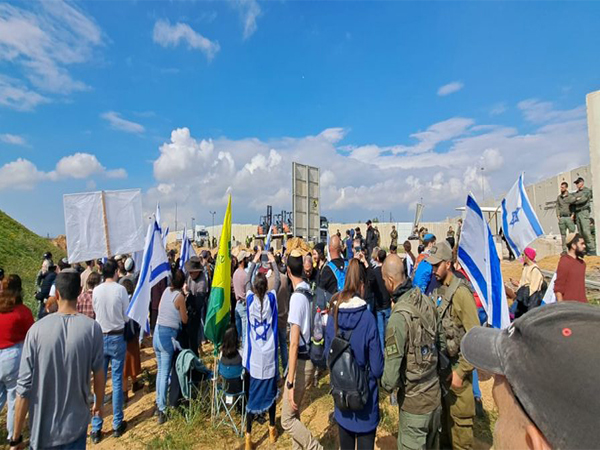'Don't Feed Hamas': Grassroots Israeli protests against Gaza aid grow
Following five consecutive days of protests, the Israel Defence Forces designated the area as a closed military zone to curtail the now-daily gatherings.

- Country:
- Israel
Tel Aviv [Israel], January 30 (ANI/TPS): Despite government efforts to curtail the protests, hundreds of Israeli protesters made their way to the Kerem Shalom border crossing to demonstrate against deliveries of humanitarian aid to Gaza on Monday. Following five consecutive days of protests, the Israel Defence Forces designated the area as a closed military zone to curtail the now-daily gatherings. Nevertheless, the turnout was larger, but unlike previous days, nobody blocked trucks. Police made 13 arrests, including one army reservist who was protesting in uniform.
The passage of aid deliveries is controversial. Israelis say that food, water and fuel are stolen by Hamas once they arrive inside the Strip. Protesters chanted, "Don't feed Hamas."
Among the Monday protesters was Noga Alfasi, whose 56-year-old aunt, Maya Goren, was murdered in captivity. "I did not come here to starve the people, and I did not come to abuse the people. And I think I even came here for the Gazans somewhere. If we just go ahead and give aid and spread this whole thing, the war won't end," Alfasi told the Tazpit Press Service.
"My aunt was kidnapped from a kindergarten. That's not humanitarian. They murdered her that way and that's not humanitarian," Alfasi noted, stressing that information about her aunt's death came from intelligence and not from Hamas. "And that is not humanitarian," she added. Under the terms of a temporary ceasefire in November, Hamas was supposed to return all the captive women and children alive or dead, but Goren's body remains in Gaza.
"If this aid is done out of mercy, then I don't understand who the mercy is for," said Alfasi. Another protester, Rina Ariel, explained to TPS why she traveled from Kiryat Arba to participate.
"To come to these protests is the most important contribution us as the home front can do to the war effort," Ariel said. "The hostages must be released, under conditions that shouldn't harm anyone or weaken the State of Israel. Our hearts cry for the hostages, and we are stopping aid to Gaza to make it clear that there will be no aid until they are released." At a Saturday evening press conference, Israeli Prime Minister Benjamin Netanyahu told reporters that a degree of aid was necessary to continue the war to free hostages and remove Hamas from control of Gaza.
"Without the minimum amount of humanitarian aid, we will not be able to complete the mission and the objectives of the war," Netanyahu said. Humanitarian aid arriving from Egypt or Israeli ports is inspected by Israel at either the Kerem Shalom border crossing where the Israeli, Gaza and Egyptian borders converge, or at the Nitzana border crossing with Egypt, which is 42 km south of Gaza.
After inspection, the trucks are routed to Egypt's adjacent Rafah border crossing to enter the Strip. Following Hamas's October 7 attacks, Israel closed Kerem Shalom for security reasons. Israelis have been protesting at Nitzana too.
On Sunday, Israeli reporter Elchanan Groner tweeted from Nitzana a photo of a delivery certificate on one of the trucks. It indicating a shipment of flour that arrived in Ashdod with "UNRWA" as the client. The UN Relief and Works Agency, which supports Palestinian refugees, is under fire following revelations that agency staff participated in Hamas's October 7 attacks on Israel. Citing Israeli intelligence reports, The Wall St. Journal reported on Monday that as much as 10 percent of the agency's staff have ties to Islamist terror groups. The US and several other Western countries have suspended funding for UNRWA. "On the one hand, Israel is conducting a campaign against UNRWA and on the other hand, it supplies them with flour and supplies for the enemy who massacred us," Groner tweeted.
According to the Coordinator of Government Activities in the Territories (COGAT), 88 trucks were inspected at Nitzana on Sunday. That day's deliveries included 70 tons of food, 440 tons of water, 210 tons of medical supplies, and 425 tons of other items. Four tankers of cooking gas and two tankers of fuel designated for the operation of essential infrastructure also entered Gaza. COGAT is a unit within the Israeli Defence Ministry that coordinates civilian issues between the Israeli government, military, international organizations and the Palestinian Authority.
Egypt's Rafah crossing is not equipped to handle large numbers of commercial deliveries. Before Oct. 7, commercial deliveries to the Strip were routed directly through Kerem Shalom. The protests have been organized by Order 9. The movement's name is a reference to the Order 8 emergency notice that army reservists receive for mobilization outside the framework of regular reserve duty.
At least 1,200 people were killed in Hamas's attacks on Israeli communities near the Gaza border on Oct. 7. The number of men, women, children and soldiers held captive in Gaza by Hamas is believed to be 136. (ANI/TPS)
(This story has not been edited by Devdiscourse staff and is auto-generated from a syndicated feed.)










